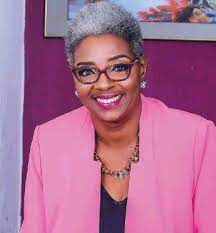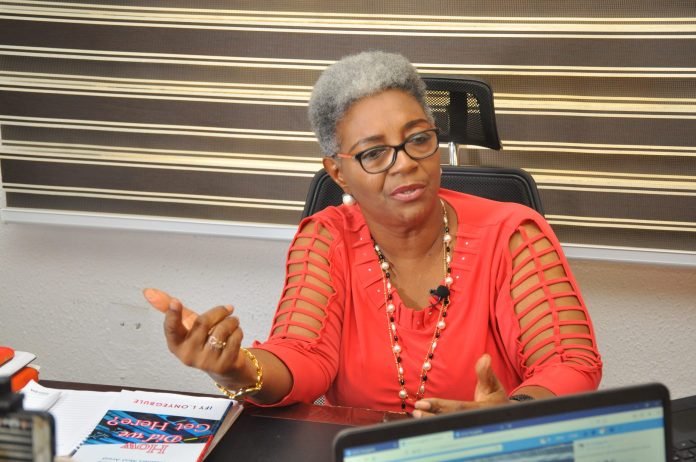Bimbo Oloyede, a revered figure in the Nigerian media landscape, shares her wisdom and experience spanning over four decades. Affectionately called “Aunty Bimbo,” she discusses her commitment to journalistic principles and the evolution of her career from news anchor to author and now a Strictly Speaking trainer. JOKE KUJENYA reports
Journalism by accident
I have often revealed the unexpected nature of my journey into journalism. I actually had no plans to become a journalist. I stumbled into the profession by accident and discovered its fascinating and fulfilling nature. And my ability to express myself through journalism became a driving force in my career.
I later found it to be a career beyond a job and that helped me to transcend and enhanced my dedication to my role. It became such that my colleagues and I were often in the newsroom, even on our days off. In fact, I had already transcended the concept of a “job” about four decades ago. My passion and enthusiasm for my work led me to engage in various opportunities, from compère and voice-overs to founding an NGO and ultimately returning to television as an independent producer.
Career path
My career track led me to adopt a somewhat reclusive approach. And till today, I firmly believe that news anchors should maintain neutrality and credibility that would allow them to be accepted by the public. This commitment to impartiality, however, often required distancing oneself from various events and engagements that might have been financially beneficial.
My career as an anchor actually opened doors for me to host and compère various events over the years, evolving into my becoming a trainer, and now, an author. My journey demonstrates the power of dedication to one’s principles and values.
Digital revolution and impact
My journey through the ever-changing media landscape has been nothing short of remarkable. It helps me to see the significance of the digital revolution and enables me to play a vital role that the digital space plays in today’s media industry. I candidly reflect on the lessons learned during the COVID-19 pandemic, and it made me realize that the digital realm is no longer a secondary option but a crucial component of media communication.
I don’t seek special favours or tokenism but calling for the appointment of women to senior positions based on merit
So, for me, “It’s time we stopped pretending that the digital revolution hasn’t happened. Rather than resisting change, I suggest that media professionals should find proficient and credible ways to harness the power of digital platforms. The goal is not to limit the wealth of information, education, and entertainment the media can provide but to enhance it.
Navigating media and digital landscape
On how the shift to the digital world has personally affected my career trajectory, I was quick to admit that I recognized the peril of ignoring the digital space. For media professionals, staying relevant requires active engagement on platforms like LinkedIn, Instagram, Facebook and others.
I also underscore the importance of tech, AI, and digital skills for journalists. In fact, AI, in particular, can be a valuable tool for generating new ideas and information. So, I encourage journalists to embrace technology while exercising caution not to rely on it blindly. In the fast-paced world of journalism, basic digital skills have become essential, as speed is of the essence when breaking news and stories.
Critical gaps in media and advancement
Personally, I don’t shy away from addressing the pressing issues in the media and development space. I believe more attention should be focused on education, good governance, and gender concerns. The alarming gaps in education are a cause for concern, with the government being held accountable for the education of children. I believe the media’s role is to advocate for curriculum development that equips students with the knowledge they need to become informed, responsible, and employable citizens.
Empowering women in media
I’m a strong advocate for women in the media and I passionately assert the need for media organizations to implement equality policies. I don’t seek special favours or tokenism but calling for the appointment of women to senior positions based on merit. I believe that gender-balance is essential to address the subjective representation of gender and female concerns in media programmes. And to achieve equitable content, I always emphasize the importance of women in top media and communication roles.
in broadcast journalism, Talent alone is not enough, and practitioners must continually learn new techniques and best practices
Broadcasting industry concern and solution
I have often expressed my concerns about the broadcasting industry’s lack of strong foundations and insufficient training. I had hinged on the need for comprehensive training programmes at basic, intermediate, and advanced levels. Talent alone is not enough, and practitioners must continually learn new techniques and best practices. I have stressed on the importance of structure, process, progression, and reward to attract and retain talent in the profession, and I will keep at it.
Mentorship and growth
Working with female journalists as a mentor, I am always enthusiastic about equipping fellow female journalists with investigative reporting skills, nurturing critical thinking, and fostering a supportive network of like-minded professionals. This has afforded me the dais to witness the evolution of women in media, from operating within their media organizations to embracing more versatile roles. As media applications converge, the flexibility and adaptability of female colleagues have become a welcome development.
Challenges and solutions
Oh, there were challenges I faced during my career, including a hiatus from broadcasting and venturing into diverse income streams. Also, balancing TV production with establishing a supermarket allowed me to maintain my profession during challenging times. I eventually returned to TV as an independent producer and successfully anchored “The News at Ten” on Channels TV for 13 years.

Ambitions and overcoming barriers
This is one aspect of life we all keep aiming at. For me in particular, the ongoing challenge of bringing my programme ideas to fruition, I must admit, remains a significant barrier, particularly for producing expensive programmes like drama. So, overcoming this barrier is still a crucial ambition for me and I believe they are such that they can make a meaningful impact on society and development if given the chance to thrive.
Notable achievements
Well, I’ll say they are what make me proud and inspire me to do more. As a pioneer female newscaster on Nigerian national TV, I presented hundreds of bulletins and conducted interviews on important issues. My radio and TV drama series on anti-corruption and conflict resolution, called “Tightrope” also left a lasting impact. My focus on gender-based violence also led to the production of programmes like “Trauma” for TV and “Voices” for radio, which tackled sensitive issues. I initiated the “Rare Gems” award ceremony, which recognized and rewarded individuals contributing to women’s development in alignment with the Millennium Development Goals.
On Strictly Speaking for Youths and Careers
It is interesting that the reaction I get from young people regarding pronunciation and public speaking is virtually the same as the reaction I get from adults and professionals. Accepting that speaking well depends on people’s level of awareness about the importance of communication.
Those that get it, are excited about the thought of improving their speaking skills because they have a reason to master good pronunciation. They know how they are going to apply it and they appreciate what having such skills will do for their personal and professional lives.
Those who think we are making a lot of fuss about nothing, often remain unschooled in several other soft skills but by the time they realize that they need them, a lot of damage has already been done. It is correctable but it takes a much longer time when they have already begun their careers. We have a programme called Stand and Deliver, which is for tertiary institutions to expose students to phonetics and public speaking.
The results are encouraging when the students take it seriously but some are not prepared to learn so we can’t help them much. Some become interested despite themselves and are surprised when they do well. It gives them a self-confidence they did not know that they needed.
Future outlook and plans
Looking ahead to the next three-to-five years, I envision exploring my acting skills, writing more books, and presenting more TV programmes. I will also continue to share my knowledge and experience with upcoming professionals on various platforms.


